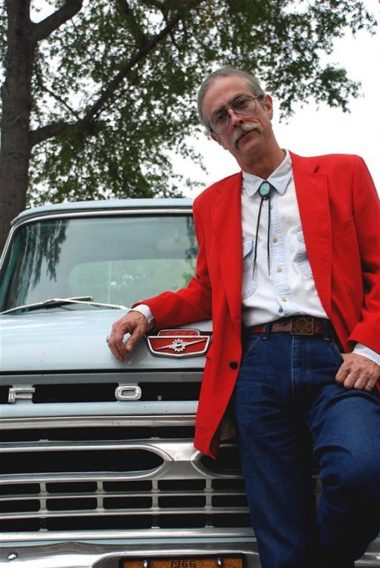He “wrote like a maniac” for a year until his pen spun out with a bad case of writer’s block. But after accepting an offer to join Elon University's religious studies department in 2005, L.D. Russell hit the literary gas pedal once more. His finished work, “Godspeed: Racing is My Religion,” explores how NASCAR can be a religious experience for its fans – just like it is for him.

“It’s those moments that are so exciting and so frightening that you really do become one with yourself,” Russell said on a recent afternoon as he leaned back in his office chair. “You feel who you are … If you find yourself yelling at the top of your lungs, that’s usually a good sign. It’s a therapeutic release in some ways.”
That isn’t to say race fans forgo church services in favor of prayer over the asphalt altar. In fact, many race fans are devout Christians, which Russell describes as the natural outcome for a sport that originated in the Bible Belt.
“In a weird way, it’s a sport about daring death,” Russell said. “Of all the major sports, I’m not sure there’s any more dangerous.”
The idea for a book that connects racing and religion didn’t originate with Russell. A friend from seminary worked for a small publishing company, and during a meeting, someone suggested the NASCAR idea. Russell’s friend and soon-to-be editor, Henry Carrigan, immediately thought of the lanky Southerner who had written about racing for the Independent Weekly alternative newspaper in Durham, N.C.
“I had a contract up front, which almost never happens,” said Russell, who lives in Hillsborough, N.C. “I jumped at the chance and wrote like a maniac for a year.”
Work stalled when Russell realized he would have no luck conducting interviews with the NASCAR drivers and mechanics. He set aside the project, at least temporarily, when the hopelessness and exhaustion caught up with him.
Then, in the fall of 2005, Russell joined the Elon faculty as a lecturer. Though he had been an adjunct instructor for the university, by making the move to a fulltime teaching position, he again had time to finish the book.
Part of what appeals to a racing fan is that a driver can get into a car, travel hundreds of laps at speeds twice as fast as typical interstate highway traffic, and emerge hours later without a scratch. Every so often, though, tragedy strikes the NASCAR nation.
One of the sport’s biggest casualties was Dale Earnhardt, the larger-than-life “good ‘ol boy” driver from Kannapolis, N.C., who in 2001 was on his last lap at the Daytona 500 when his famous black “No. 3” car slammed into the wall as he rounded the last curve of the race. “The death of Earnhardt was a watershed moment for the sport,” Russell said during his interview. “It made people wonder: What’s going on here? What is it about this world to take this man from us?”
After all, Russell writes, Earnhardt was one of the “good guys,” a driver who escaped poverty and clawed his way to the top of the racing circuit. His nickname, “The Intimidator,” notwithstanding, even Earnhardt’s fiercest rivals showed a grudging respect for his driving abilities.
Those questions led him to discuss another major theme: Part of the religious experience for NASCAR fans comes not from blaming God for a tragedy on the track, but in taking a closer look at one’s faith to reassess ways to grow closer with a deity.
“Surely much of the appeal of racing, aside from all the flash and noise and our cultural fixation on fame and riches, is this very experience of transcendence,” he writes toward the end of his book. “Getting caught up in the excitement of a race draws us up and out of our everyday world for a while and, because we so often seek to live our lives through the exploits of our heroes, teases us with a taste of vicarious victory.
“So for a few hours on a Sunday afternoon we can find strength to survive the little deaths that come to us whenever we endure disappointments, suffer sickness, and bear up under boredom, as well as a measure of comfort and assurance while we await our own passage through the valley of the shadow.”
Elon’s religious honor society, Theta Alpha Kappa, is sponsoring a book reading by L.D. Russell on Oct. 30 at 6 p.m. in the Isabella Cannon Room. The public is invited to attend.


